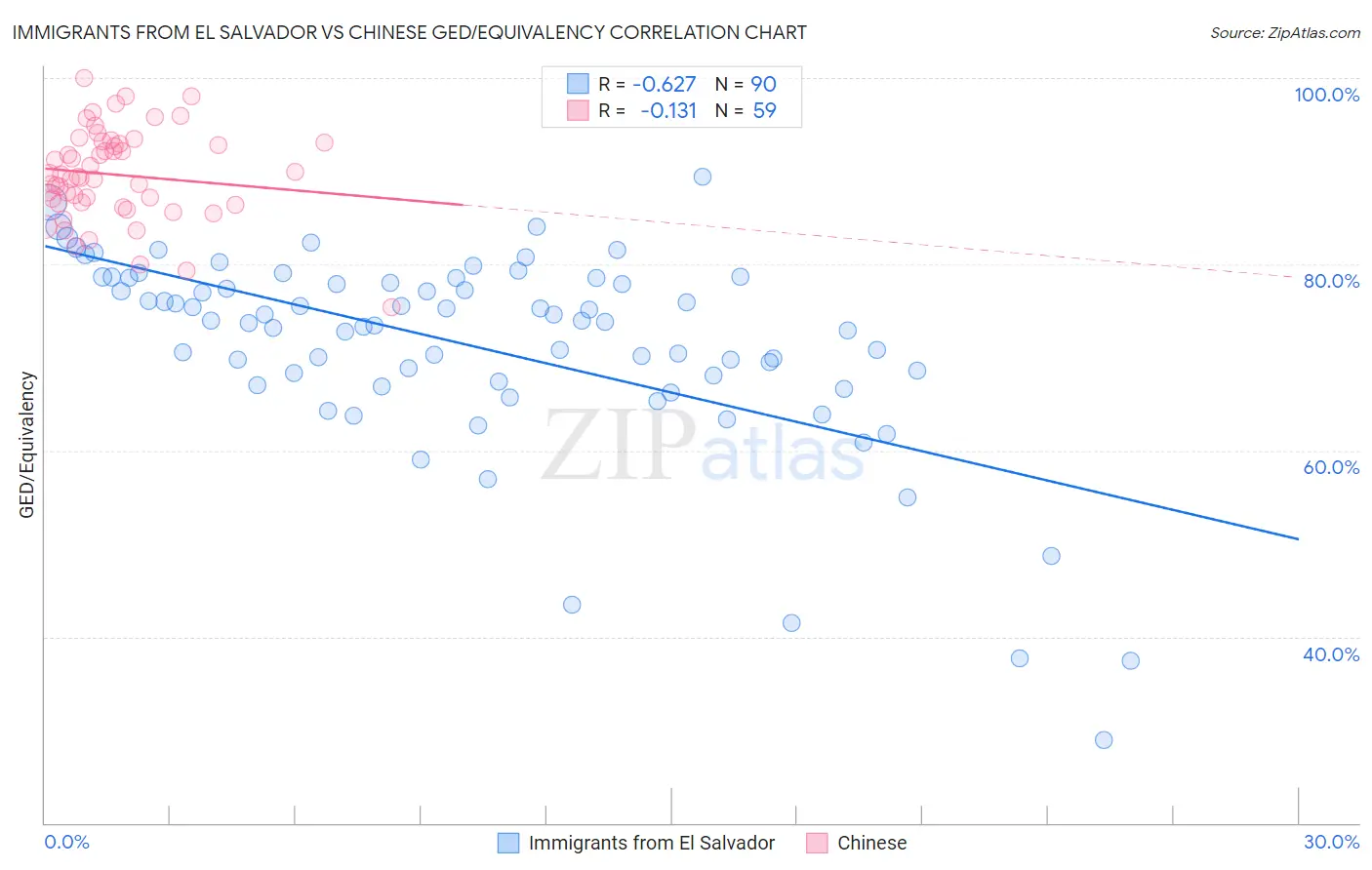Immigrants from El Salvador vs Chinese GED/Equivalency
COMPARE
Immigrants from El Salvador
Chinese
GED/Equivalency
GED/Equivalency Comparison
Immigrants from El Salvador
Chinese
77.6%
GED/EQUIVALENCY
0.0/ 100
METRIC RATING
339th/ 347
METRIC RANK
89.0%
GED/EQUIVALENCY
99.9/ 100
METRIC RATING
9th/ 347
METRIC RANK
Immigrants from El Salvador vs Chinese GED/Equivalency Correlation Chart
The statistical analysis conducted on geographies consisting of 357,852,938 people shows a significant negative correlation between the proportion of Immigrants from El Salvador and percentage of population with at least ged/equivalency education in the United States with a correlation coefficient (R) of -0.627 and weighted average of 77.6%. Similarly, the statistical analysis conducted on geographies consisting of 64,809,883 people shows a poor negative correlation between the proportion of Chinese and percentage of population with at least ged/equivalency education in the United States with a correlation coefficient (R) of -0.131 and weighted average of 89.0%, a difference of 14.7%.

GED/Equivalency Correlation Summary
| Measurement | Immigrants from El Salvador | Chinese |
| Minimum | 29.0% | 75.4% |
| Maximum | 89.4% | 100.0% |
| Range | 60.4% | 24.6% |
| Mean | 71.2% | 89.6% |
| Median | 73.8% | 89.4% |
| Interquartile 25% (IQ1) | 67.4% | 86.6% |
| Interquartile 75% (IQ3) | 78.5% | 93.0% |
| Interquartile Range (IQR) | 11.1% | 6.5% |
| Standard Deviation (Sample) | 10.9% | 4.9% |
| Standard Deviation (Population) | 10.8% | 4.9% |
Similar Demographics by GED/Equivalency
Demographics Similar to Immigrants from El Salvador by GED/Equivalency
In terms of ged/equivalency, the demographic groups most similar to Immigrants from El Salvador are Tohono O'odham (77.5%, a difference of 0.16%), Mexican (77.4%, a difference of 0.24%), Immigrants from Guatemala (77.9%, a difference of 0.38%), Immigrants from Yemen (77.9%, a difference of 0.41%), and Immigrants from Dominican Republic (78.0%, a difference of 0.47%).
| Demographics | Rating | Rank | GED/Equivalency |
| Immigrants | Azores | 0.0 /100 | #332 | Tragic 78.7% |
| Salvadorans | 0.0 /100 | #333 | Tragic 78.6% |
| Guatemalans | 0.0 /100 | #334 | Tragic 78.5% |
| Immigrants | Latin America | 0.0 /100 | #335 | Tragic 78.5% |
| Immigrants | Dominican Republic | 0.0 /100 | #336 | Tragic 78.0% |
| Immigrants | Yemen | 0.0 /100 | #337 | Tragic 77.9% |
| Immigrants | Guatemala | 0.0 /100 | #338 | Tragic 77.9% |
| Immigrants | El Salvador | 0.0 /100 | #339 | Tragic 77.6% |
| Tohono O'odham | 0.0 /100 | #340 | Tragic 77.5% |
| Mexicans | 0.0 /100 | #341 | Tragic 77.4% |
| Pima | 0.0 /100 | #342 | Tragic 76.4% |
| Immigrants | Central America | 0.0 /100 | #343 | Tragic 76.4% |
| Spanish American Indians | 0.0 /100 | #344 | Tragic 76.3% |
| Immigrants | Mexico | 0.0 /100 | #345 | Tragic 75.7% |
| Houma | 0.0 /100 | #346 | Tragic 75.0% |
Demographics Similar to Chinese by GED/Equivalency
In terms of ged/equivalency, the demographic groups most similar to Chinese are Carpatho Rusyn (89.1%, a difference of 0.020%), Norwegian (89.0%, a difference of 0.040%), Eastern European (89.1%, a difference of 0.070%), Bulgarian (89.0%, a difference of 0.080%), and Thai (89.1%, a difference of 0.12%).
| Demographics | Rating | Rank | GED/Equivalency |
| Filipinos | 100.0 /100 | #2 | Exceptional 89.5% |
| Immigrants | Singapore | 100.0 /100 | #3 | Exceptional 89.3% |
| Iranians | 100.0 /100 | #4 | Exceptional 89.2% |
| Latvians | 100.0 /100 | #5 | Exceptional 89.2% |
| Thais | 100.0 /100 | #6 | Exceptional 89.1% |
| Eastern Europeans | 99.9 /100 | #7 | Exceptional 89.1% |
| Carpatho Rusyns | 99.9 /100 | #8 | Exceptional 89.1% |
| Chinese | 99.9 /100 | #9 | Exceptional 89.0% |
| Norwegians | 99.9 /100 | #10 | Exceptional 89.0% |
| Bulgarians | 99.9 /100 | #11 | Exceptional 89.0% |
| Lithuanians | 99.9 /100 | #12 | Exceptional 88.9% |
| Immigrants | Iran | 99.9 /100 | #13 | Exceptional 88.9% |
| Cypriots | 99.9 /100 | #14 | Exceptional 88.9% |
| Okinawans | 99.9 /100 | #15 | Exceptional 88.9% |
| Immigrants | Taiwan | 99.9 /100 | #16 | Exceptional 88.8% |